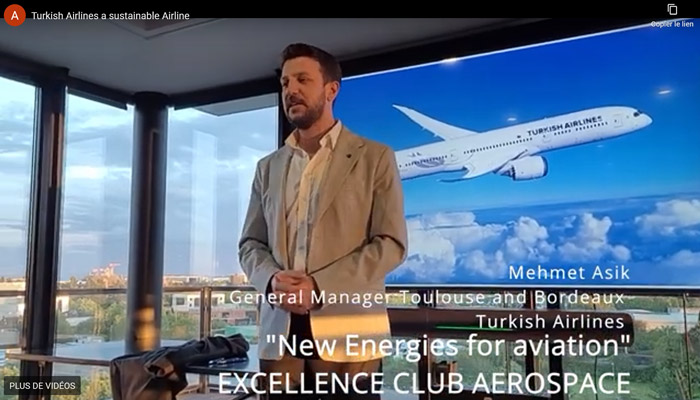Exploring Tomorrow’s Aviation with New Energiess
In the quest for sustainable transportation, the aviation industry stands at a crossroads. With increasing environmental concerns and a growing demand for air travel, the need for cleaner, more efficient energy sources has never been more pressing.
Here, we delve into some of the most promising new energies that hold the potential to transform tomorrow’s aviation landscape;
Biofuels
Biofuels have emerged as one of the leading contenders for reducing aviation’s carbon footprint. These fuels, derived from renewable biomass sources such as algae, waste oils, and plant matter, offer a promising alternative to traditional jet fuels. Unlike fossil fuels, biofuels produce fewer emissions and can be used in existing aircraft engines with minimal modifications. Airlines like Turkish Airlines, United, KLM have already conducted successful flights using biofuels, demonstrating their viability as a sustainable aviation solution.
Hydrogen
Hydrogen has long been touted as a clean and abundant energy source with the potential to power various modes of transportation, including aircraft. Hydrogen fuel cells generate electricity by combining hydrogen with oxygen, producing only water vapor as a byproduct. While hydrogen-powered aircraft are still in the early stages of development, companies like ZeroAvia and Airbus are actively working on prototypes and conducting feasibility studies. With advancements in hydrogen storage and infrastructure, hydrogen-powered aviation could become a reality in the coming decades.
Electric Propulsion
Electric propulsion systems offer another promising pathway towards sustainable aviation. By replacing traditional gas turbines with electric motors powered by batteries or fuel cells, electric aircraft can significantly reduce emissions and noise pollution. While electric propulsion is currently limited to smaller aircraft for short-haul flights, ongoing research and development aim to scale up the technology for larger commercial planes. Companies like Lilium and Eviation are leading the charge in electric aviation, with plans to bring emission-free air travel to the masses.
Solar Power
Solar power holds immense potential for extending the range and endurance of electric aircraft. Solar panels installed on the wings or fuselage of an aircraft can capture sunlight and convert it into electricity, supplementing the onboard power supply and reducing the reliance on traditional energy sources. While solar-powered aircraft are primarily used for experimental purposes and unmanned aerial vehicles (UAVs) at present, advancements in solar cell efficiency and lightweight materials could pave the way for commercial solar-electric aircraft in the future.
Hybrid Solutions
Hybrid propulsion systems, combining multiple energy sources such as fossil fuels, biofuels, batteries, and fuel cells, offer a flexible approach to sustainable aviation. By leveraging the strengths of each energy source, hybrid aircraft can optimize performance, range, and emissions according to the specific requirements of the mission. This hybridization approach allows for gradual transitions towards greener technologies while ensuring compatibility with existing infrastructure and regulatory frameworks.
As the aviation industry strives to decarbonize and mitigate its environmental impact, the adoption of new energies is essential for driving innovation and ushering in a new era of sustainable air travel. While significant challenges remain, including technological barriers, regulatory hurdles, and economic viability, the collective efforts of stakeholders across the aviation ecosystem are propelling us towards a future where flying is not only faster and safer but also cleaner and greener. By embracing new energies and fostering collaboration, we can soar to new heights while preserving the planet for generations to come.
New Aviation Energies at Turkish Airlines
Turkish Airlines, the flag carrier airline of the Republic of Türkiye, has taken its place among the largest airline companies in the world with its rapid growth trend since its foundation in 1933, with the objective of carrying out domestic and international passenger and cargo air transportation activities. As the airline that flies to more countries than any other airline in the world, Turkish Airlines currently has a network of 370 destinations in 130 countries with its 454 aircraft fleet.
This huge network and operations make efficient energy practices inevitable. The company is at the forefront of embracing new energies to propel the aviation industry towards sustainability. With a commitment to reducing carbon emissions and embracing cleaner technologies, the airline is actively exploring innovative solutions.
Turkish Airlines adopts the principles of using energy with maximum efficiency, reducing the use of natural resources and sustainable development. In this context, Turkish Airlines declares its Energy Policy to bring together its employees, customers, suppliers, subcontractors, affiliates, all business partners, and shareholders for the same purpose.
According to IATA projections, the aviation sector is expected to have a significant share in human-induced greenhouse gas emissions in the future. Accordingly, the sector aims to reach a net zero emission level in 2050 in line with the 1.5ºC target of the Paris Agreement. To this end, IATA emphasises sustainable aviation fuel (SAF), new aircraft technologies, use of electricity and hydrogen energy, offsetting carbon emissions and carbon capture practices.
Turkish Airlines shapes its climate action efforts in this direction. Fuel efficiency applications are a prominent field of study in terms of emission reduction and cost savings. While adding new aircraft to its fleet, Turkish Airlines also favours models with high fuel efficiency and low emission levels. In addition, the acquisition of efficient aircraft models with high fuel efficiency to the fleet provides savings in maintenance, repair and operating costs. On the other hand, the fact that the interior design and features of new generation aircraft respond more accurately to changing passenger expectations has a positive impact on customer satisfaction and loyalty.
From biofuels derived from renewable sources to electric propulsion systems, Turkish Airlines is also exploring a range of alternatives to traditional jet fuels. These technologies not only reduce environmental impact but also pave the way for more efficient and eco-friendly air travel.
By investing in research, development, and partnerships, Turkish Airlines is positioning itself as a leader in the adoption of new aviation energies. Through these efforts, the airline aims to create a greener future for aviation while continuing to provide exceptional service to passengers worldwide.
Turkiye’s national flag carrier has started using sustainable aviation fuel on its flights to help reduce its carbon footprint.Turkish Airlines’ first flight using aviation fuel obtained from sustainable sources departed from Istanbul Airport on February 2, 2022 for the Charles De Gaulle Airport in Paris.
While sustainable fuel, which reduces emissions by 87%, has been used for one day a week on the chosen route, the airline is currently using it on different routes on a wider scale.
Sourced from oil refining company Neste, the environmentally friendly fuel is stored by Turkish Airlines subsidiary Turkish Fuel Services (TFS) to be loaded onto aircraft after getting blended with jet fuel.
As Turkish Airlines is making waves in the national and international arena with its sustainability-focused activities and awards, flag carrier was awarded the “Airline Sustainability Innovation of the Year” award by CAPA – Centre for Aviation for its innovative efforts within the scope of sustainability.
The global carrier, which puts sustainability at the center of its business model, won this award within the scope of sustainable innovation with the “Microalgae Based Sustainable Bio-Jet Fuel Project (MICRO-JET)”, in which it worked closely with scientists to develop the world’s first carbon negative sustainable aviation fuel (SAF).
Within the scope of the “Microalgae Based Sustainable Bio-Jet Fuel Project (MICRO-JET)”, jointly carried out with Boğaziçi University, it is aimed to produce biofuels from microalgae using hydro-processed fatty acids and hydrothermal liquefaction methods.
Once the project is completed, the first carbon-negative integrated bio refinery of Turkey and Europe will begin service.
Turkish Airlines also implemented over 100 operational optimization projects since 2008 to lower its carbon footprint; saving 57,581 tons of fuel, offsetting 6,619 tons and preventing nearly 181,379 tons of carbon dioxide from being released into the atmosphere in 2022.
Sustainability at Turkish Airlines: Navigating Towards a Greener Future
Turkish Airlines, as the airline that flies to most countries in the world, recognizes the imperative of sustainability in the aviation industry. With a commitment to responsible operations, environmental stewardship, and social impact, the airline has embarked on a journey towards a greener future. Here’s a closer look at sustainability efforts undertaken by Turkish Airlines:
Fuel Efficiency and Emissions Reduction: Turkish Airlines has made significant strides in improving fuel efficiency and reducing greenhouse gas emissions across its fleet. Through fleet modernization initiatives, the airline has invested in new, fuel-efficient aircraft equipped with state-of-the-art technology, such as Boeing 787 Dreamliners and Airbus A350s. These aircraft feature advanced aerodynamics, lightweight materials, and fuel-efficient engines, leading to substantial reductions in fuel consumption and emissions per passenger kilometer.
Alternative Fuels: Recognizing the importance of transitioning to sustainable aviation fuels (SAFs), Turkish Airlines has actively supported research and development efforts in this field. The airline has participated in biofuel demonstration flights and collaborated with industry partners to explore the viability of alternative fuels derived from renewable sources. By incorporating SAFs into its fuel supply chain, Turkish Airlines aims to reduce its reliance on fossil fuels and minimize its carbon footprint over the long term.
Energy Efficiency and Waste Reduction: Turkish Airlines has implemented various energy-saving measures and waste reduction initiatives to minimize its environmental impact on the ground. This includes optimizing aircraft operations, improving ground handling procedures, and investing in energy-efficient infrastructure at airports and facilities. Additionally, the airline has adopted recycling programs and sustainable procurement practices to minimize waste generation and promote circularity within its operations.
Community Engagement and Social Responsibility: Turkish Airlines is committed to making a positive difference in the communities it serves through social responsibility initiatives and community engagement programs. From supporting education and healthcare projects to promoting cultural exchange and environmental conservation, the airline strives to create meaningful impact beyond its core business activities. Through partnerships with NGOs, government agencies, and local stakeholders, Turkish Airlines aims to contribute to sustainable development and improve the quality of life for people around the world.
Transparency and Accountability: Turkish Airlines maintains transparency and accountability in its sustainability efforts by regularly reporting on its environmental performance and progress towards sustainability goals. The airline publishes annual sustainability reports detailing its initiatives, achievements, and challenges, providing stakeholders with insights into its environmental, social, and governance (ESG) practices. By fostering transparency and open dialogue, Turkish Airlines seeks to build trust with stakeholders and drive continuous improvement in sustainability performance.
As Turkish Airlines continues to expand its global reach and connect people and cultures around the world, its commitment to sustainability remains unwavering. By integrating environmental considerations into its business strategy and operations, the airline aims to lead by example and inspire positive change within the aviation industry. With innovation, collaboration, and a steadfast dedication to sustainability, Turkish Airlines is navigating towards a greener future, where air travel is both efficient and environmentally responsible. Source: Mehmet Asik, Turkish Airlines General Manager Toulouse & Bordeaux.












Be the first to comment on "Turkish Airlines & Tomorrow’s aviation"